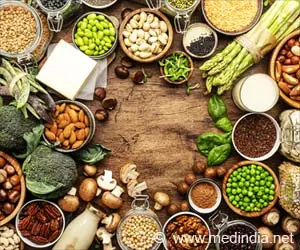
Chennai, June 25 -- Highlights:
* Healthy plant-based diets linked to lower risk of hidden heart damage
* Unhealthy plant-based diets// may raise the risk instead
* Eating habits can silently shape your long-term heart health
Not all plant-based diets are created equal. A new study finds that the kind of plant foods you eat matters as well for your heart's future. Traditionally, giving up meat has been considered a short cut to better heart health ( ref1 ).
In a study of over 7,700 U.S. adults, researchers found that people who ate a healthy plant-based diet , full of fruits, vegetables, whole grains, and legumes , were almost 50 percent less likely to show signs of hidden heart stress.
On the other hand, those who ate a lot of unhealthy plant-based foods like white bread , fries, and sugary snacks were 65 percent more likely to have elevated levels of cardiac troponin I (a marker of heart stress or damage). These signs were found through special blood tests that detect heart strain, even before symptoms appear. The study was published in the American Journal of Preventive Cardiology .
Not All Plant-Based Diets Are Equal
Plant-based eating has become a popular buzzword, often associated with better health. But this new research emphasizes a crucial point: the quality of the plant-based diet matters. Choosing a plant-based diet is a powerful step, but it's not a magic fix on its own. What truly makes the difference is how balanced and nourishing those food choices are . Skipping meals , eating too little protein, or relying only on carbs-even if they're plant-based-can leave your heart without the support it needs. A healthy diet isn't just about what you cut out, but what you include to fuel your body.
Simply avoiding meat does not guarantee protection from heart issues. The study clearly differentiates between "healthy" and "unhealthy" plant-based diets and suggests that blindly embracing a plant-based label without considering food quality could be misleading.
What Does Troponin Tell Us? Troponin is a protein released into the blood when the heart muscle is under stress or injured . Elevated levels, even without obvious symptoms, can indicate subclinical cardiovascular disease . This is a silent form of heart stress that often goes unnoticed until more serious problems arise.
The study's spotlight on cardiac troponin I as a sensitive marker provides an early glimpse into how diet could be quietly influencing heart health long before symptoms show up.
Eating for the Heart: What to Include
A healthy plant-based diet includes:
* Fresh vegetables and fruits
* Whole grains
* Legumes (like beans, lentils, and peas)
* Nuts and seeds
* Healthy oils in moderation
Things to avoid or minimize:
* Refined grains
* Sugar-sweetened beverages
* Packaged snack foods
* Fried plant-based options
The takeaway? Choose plants that are as close to their natural form as possible.
What This Means for Everyday Eating
You don't need to go vegan to see benefits. Increasing the proportion of healthy plant-based foods in your diet and cutting down on processed items can support heart health. Swapping white rice for brown, or choosing an apple over a packaged granola bar, can shift your diet toward the healthier end of the plant-based spectrum.
Budget-friendly and culturally diverse choices are also possible. Whole grains like oats or millet , affordable legumes like chickpeas , and local seasonal vegetables can form the backbone of a heart-smart eating pattern.
The Broader Message
This study adds to growing evidence that diet is one of the most powerful tools we have to prevent heart disease. It also highlights that public health efforts should focus not just on encouraging plant-based diets, but on promoting the right kind of plant-based eating.
With heart disease still the leading cause of death in the United States, even small shifts in population-level dietary habits could save thousands of lives.
Your plate could be your heart's greatest protector or quietest threat. Eating plant-based is a start, but eating well within that framework is what truly counts. The difference between a sugar-loaded smoothie and a heart-smart salad might be the difference between silent heart damage and lasting health. If there was ever a time to pay closer attention to what fills your grocery bag and dinner plate, it is now. Choose wisely, cook simply, and nourish your heart with every bite.
Source-Medindia
Medindia Copyright
